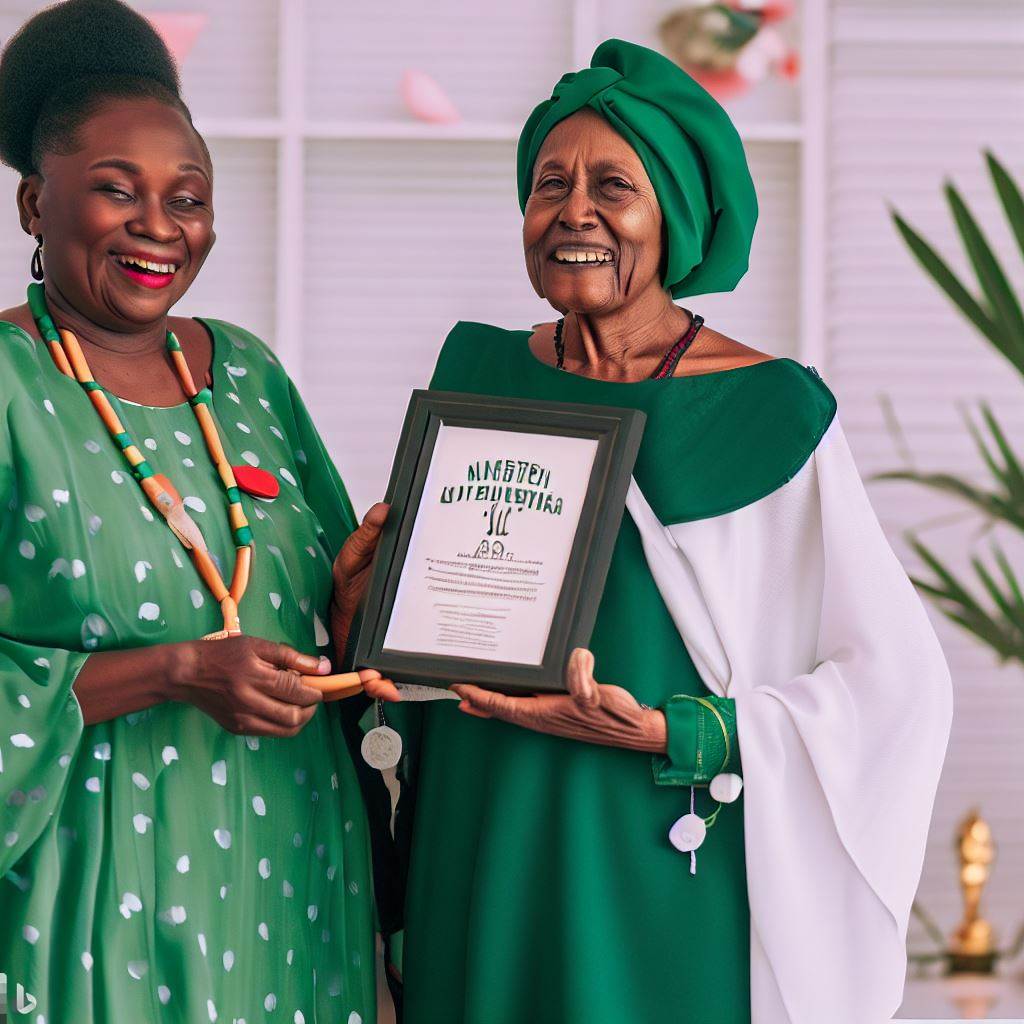Introduction
Insights into the Nigerian Work Environment of a Dietitian offers a concise glimpse into the professional landscape that dietitians navigate in Nigeria.
This brief explores the unique challenges, opportunities, and cultural considerations that shape their practice, aiming to shed light on the specific factors impacting their role and impact within the country’s healthcare system.
Overview of the Nigerian Work Environment
Key characteristics of the Nigerian work environment
- Highly competitive: The Nigerian work environment is known for its intense competition among professionals.
- Diverse cultures and languages: Nigeria is a multiethnic country with over 250 different ethnic groups, each with its own language and cultural practices.
- Dynamic and fast-paced: The Nigerian work environment is dynamic and characterized by rapid changes and constant innovation.
- Challenging: Working in Nigeria often involves dealing with a wide range of challenges and obstacles on a daily basis.
- Hierarchical structure: Nigerian organizations usually have a hierarchical structure with clear lines of authority and decision-making.
- Strong work ethic: Nigerians are known for their strong work ethic and dedication to their professions.
- Networking is essential: Building and maintaining professional networks is crucial for career advancement in Nigeria.
- Respect for seniority: Respect for elders and those in positions of authority is deeply ingrained in Nigerian culture.
- High value on education: Education is highly valued in Nigerian society, and continuous professional development is important.
Read: The Path to Becoming a Surgeon in Nigeria
Importance of understanding the work environment as a dietitian
- Client diversity: As a dietitian in Nigeria, understanding the diverse cultural backgrounds of your clients is crucial in providing effective diet plans.
- Adapting to challenges: The Nigerian work environment presents unique challenges that require dietitians to be adaptable and quick-thinking.
- Effective communication: Understanding the Nigerian work environment facilitates effective communication with clients, colleagues, and superiors.
- Career growth opportunities: Being aware of the characteristics of the work environment enables dietitians to identify career growth opportunities.
- Maximizing impact: With a deep understanding of the work environment, dietitians can maximize their impact on clients’ health and wellness.
- Networking and collaboration: Knowing the key characteristics of the Nigerian work environment helps dietitians build valuable professional networks and collaborate with others.
- Continuous learning: Recognizing the importance of the work environment encourages dietitians to engage in continuous learning and professional development.
- Avoiding cultural insensitivity: Understanding the Nigerian work environment helps dietitians avoid cultural insensitivity and provide culturally sensitive care.
- Promoting diversity and inclusion: By understanding the work environment, dietitians can promote diversity and inclusion in their practice.
Challenges and Opportunities Faced by Nigerian Dietitians
Limited resources and infrastructure
Nigerian dietitians face significant challenges due to limited resources and infrastructure available to them. They often struggle to access necessary equipment and technology required for their practice. The lack of updated facilities hinders their ability to provide optimal care to their patients.
This limitation also affects their research and development, making it difficult to stay abreast of the latest advancements.
Cultural beliefs and misconceptions about diet and nutrition
One of the major challenges Nigerian dietitians face is the prevalence of cultural beliefs and misconceptions. Many Nigerians hold traditional beliefs about food and nutrition, which may contradict scientific evidence. It becomes challenging for dietitians to convince individuals to adopt evidence-based dietary practices. There is a need for cultural sensitivity and effective communication in order to overcome these challenges.
Lack of awareness and appreciation for the dietitian’s role
Nigerian dietitians often struggle with a lack of awareness and appreciation for their profession.
Many people are unaware of the role dietitians play in promoting health and preventing diseases.
As a result, they are often undervalued and their expertise is not fully utilized within healthcare systems.
This lack of recognition can be discouraging and hinder the growth of the profession in Nigeria.
Opportunities for growth and impact in promoting health
Despite the challenges, Nigerian dietitians have numerous opportunities for growth and impact in promoting health. There is a growing interest in health and wellness among Nigerians, providing dietitians with a receptive audience. By raising awareness and debunking misconceptions, dietitians can make a significant impact in improving public health.
There is also an increasing recognition of the importance of preventive healthcare, which creates new avenues for dietitians to collaborate with other healthcare professionals. Social media platforms and technology advancements also offer opportunities to reach a wider audience and disseminate evidence-based information.
In summary, Nigerian dietitians face various challenges such as limited resources, cultural beliefs, and lack of awareness.
However, there are also opportunities for growth and impact in promoting health. It is essential to address these challenges and leverage the opportunities to maximize the role of dietitians in Nigeria’s healthcare system.
Read: Dietitian Licensing Process in Nigeria: An Overview

Job Responsibilities of Nigerian Dietitians
Nigerian Dietitians play a crucial role in the healthcare system, specifically in the field of nutrition.
With their expertise in food and nutrition, they contribute significantly to the well-being of individuals and communities.
This blog section aims to provide insights into the job responsibilities of Nigerian Dietitians, highlighting their impact on clients and the overall society.
- Assessing clients’ nutritional needs and developing personalized plans: Nigerian Dietitians are experts in assessing the nutritional needs of clients and developing personalized plans based on their specific requirements. They consider various factors such as age, medical conditions, lifestyle, and cultural background to create tailored dietary recommendations.
- Educating individuals and communities about proper nutrition: One of the essential responsibilities of Nigerian Dietitians is to educate individuals and communities about proper nutrition. They provide evidence-based information on healthy eating, balanced diets, and the importance of physical activity. Through seminars, workshops, and community programs, dietitians raise awareness and empower individuals to make informed choices to improve their overall health.
- Collaborating with healthcare professionals to provide comprehensive care: Nigerian Dietitians work collaboratively with healthcare professionals to provide comprehensive care to patients. They actively participate in multidisciplinary teams, sharing their nutrition expertise and contributing to the overall treatment plan.
- Monitoring and evaluating clients’ progress: Nigerian Dietitians play a crucial role in monitoring and evaluating clients’ progress towards their nutritional goals. They regularly assess clients’ dietary adherence, identify potential barriers, and make necessary adjustments to the nutrition plan.
Nigerian Dietitians excel in promoting health, crafting personalized nutrition plans, and driving positive changes in the Nigerian work environment.
Read: Practicing Dentistry: Rural vs Urban Nigeria
The Role of Nigerian Dietitians in Public Health
Promoting healthy eating habits among populations
Nigerian dietitians play a crucial role in promoting healthy eating habits among the population. They educate individuals and communities on the importance of a balanced diet and the role it plays in maintaining overall health and preventing diseases.
Creating awareness about nutrition
Dietitians work tirelessly to create awareness about nutrition and its impact on health. They engage in community outreach programs, conduct seminars, and give presentations to educate the public on the importance of making healthy food choices.
Developing personalized meal plans
Nigerian dietitians work with individuals to develop personalized meal plans based on their specific dietary needs. They consider factors such as age, gender, medical conditions, and cultural preferences to create a diet that is suitable and sustainable for the individual.
Promoting locally available and sustainable foods
Dietitians in Nigeria also focus on promoting locally available and sustainable foods. They educate the public on the benefits of consuming traditional foods and encourage the use of local ingredients to promote better nutritional outcomes.
Read: Step-by-step Guide to Becoming a Nursing Assistant in Nigeria
Addressing common nutritional deficiencies and diseases
Nigerian dietitians play a critical role in addressing common nutritional deficiencies and diseases prevalent in the country. They work towards identifying and managing nutritional deficiencies, such as vitamin and mineral deficiencies, that can lead to various health complications.
Conducting nutrition assessments and screenings
Dietitians conduct comprehensive nutrition assessments and screenings to identify individuals at risk of nutritional deficiencies. They analyze dietary intake, assess body composition, and conduct blood tests to identify deficiencies and develop appropriate intervention strategies.
Providing individualized nutrition counseling
Nigerian dietitians provide individualized nutrition counseling to individuals diagnosed with nutritional deficiencies or diseases. They develop personalized plans that focus on meeting specific nutrient requirements and improving overall health outcomes.
Collaborating with healthcare professionals
Dietitians collaborate with other healthcare professionals to provide comprehensive care to patients with nutrition-related diseases. They work together with doctors, nurses, and pharmacists to ensure coordinated care and effective management of patients’ nutritional needs.
Advocating for policies that support nutrition and health
Nigerian dietitians are advocates for policies that support nutrition and health at both the individual and population levels. They work towards influencing policy decisions that promote access to nutritious foods and create environments that support healthy lifestyle choices.
Engaging with policymakers
Dietitians actively engage with policymakers to advocate for policies that prioritize nutrition and health. They provide expert advice, evidence-based research, and recommendations to influence policy decisions related to food production, labeling, and marketing, as well as healthcare provisions.
Collaborating with community organizations
Nigerian dietitians collaborate with community organizations to implement nutrition programs and initiatives. They work to improve food security, promote breastfeeding, and support the implementation of nutrition-sensitive interventions to address the underlying causes of malnutrition.
In general, Nigerian dietitians play a vital role in promoting public health through various interventions. They promote healthy eating habits, address nutritional deficiencies and diseases, and advocate for policies that support nutrition and health. Their expertise and efforts contribute significantly to improving the overall health and well-being of the Nigerian population.
Read: Role of Dietitians in Nigeria’s Public Health Sector
Important Skills and Qualities for Nigerian Dietitians
A career as a dietitian in Nigeria requires a unique set of skills and qualities to be successful in the work environment. Nigerian dietitians must possess strong communication skills in culturally diverse settings.
Moreover, critical thinking and problem-solving abilities are crucial for Nigerian dietitians to effectively assess and address their clients’ nutritional needs. Another essential skill for Nigerian dietitians is adaptability. They must be able to work in resource-limited environments and find innovative solutions to ensure their clients receive proper nutrition.
Continuous learning and professional development are also vital qualities for Nigerian dietitians. The field of nutrition is constantly evolving, and dietitians must stay updated on the latest research and advancements in order to provide the best care for their clients.
Strong communication skills in culturally diverse settings
- Nigerian dietitians should be able to effectively communicate with clients from various cultural backgrounds.
- They must be sensitive to cultural differences and tailor their communication style accordingly.
- Being able to speak multiple languages can be an advantage for Nigerian dietitians working with diverse populations.
Critical thinking and problem-solving abilities
- Nigerian dietitians must possess the ability to analyze complex nutritional issues and develop practical solutions.
- They should be able to assess individual needs and create personalized dietary plans for their clients.
- Problem-solving skills are especially important when dealing with clients who have specific dietary restrictions or medical conditions.
Adaptability and ability to work in resource-limited environments
- Nigerian dietitians often encounter challenges due to limited resources, such as access to certain foods or medical equipment.
- They must be creative in finding alternative solutions and adapting their strategies to suit the available resources.
- Working in resource-limited environments also requires flexibility and resilience to handle unexpected obstacles.
Continuous learning and professional development
- Nigerian dietitians should have a strong desire to stay updated on the latest research and advancements in the field of nutrition.
- They should actively seek out opportunities for professional development, such as attending conferences and obtaining additional certifications.
- Continuous learning ensures that Nigerian dietitians can provide evidence-based and up-to-date nutritional advice to their clients.
Generally, Nigerian dietitians need a combination of strong communication skills, critical thinking abilities, adaptability, and a commitment to continuous learning in order to excel in their work environment.
These skills and qualities enable them to provide effective and culturally sensitive nutritional care to their clients in Nigeria’s diverse and resource-limited settings.
Read: Oral Health Challenges and Dentistry in Nigeria
Personal Experiences and Insights of a Nigerian Dietitian
Challenges faced on a day-to-day basis
- Limited resources and infrastructure make it difficult to provide comprehensive nutritional care.
- Dealing with a lack of awareness and understanding of the importance of proper nutrition.
- Balancing cultural beliefs and traditional practices with evidence-based dietary recommendations.
- Navigating the bureaucratic healthcare system and encountering red tape.
- Working long hours and dealing with high stress levels in a demanding profession.
Rewarding aspects of the profession
- Making a positive impact on people’s lives by improving their health through nutrition.
- The satisfaction of helping patients achieve their nutrition goals and witnessing their progress.
- Continuous learning and staying updated with the latest research and advancements in the field.
- Collaborating with a multidisciplinary team to provide holistic care to patients.
- The fulfillment derived from educating individuals and communities about healthy eating habits.
Tips for success in the Nigerian work environment
- Cultivate strong communication skills to effectively convey the importance of nutrition to diverse populations.
- Develop cultural competence and an understanding of local customs to navigate cultural challenges.
- Continuously seek professional development opportunities to enhance knowledge and skills.
- Network and collaborate with other healthcare professionals to improve patient outcomes.
- Advocate for policy changes and improved resources to address the challenges faced by dietitians in Nigeria.
Being a dietitian in Nigeria has challenges due to limited resources, cultural complexities, and bureaucratic hurdles.
However, it offers rewarding experiences, like positively impacting lives and collaborating with a multidisciplinary team. To succeed, dietitians must have strong communication skills, cultural competence, continuous professional development, and advocacy for policy changes and improved resources.
Through these efforts, they can make a significant difference in improving nutrition and health outcomes in the Nigerian work environment.
See Related Content: Opportunities and Challenges in Nigeria’s Massage Industry
Conclusion
Summary of key points
The Nigerian work environment for dietitians can be challenging yet rewarding. It requires adaptability, resilience, and continuous learning. Dietitians play a vital role in promoting healthy lifestyles and disease prevention.
Closing thoughts or call to action
As the demand for dietitians increases, it is crucial for the Nigerian government and healthcare sector to provide more support and resources for these professionals.
Investing in training programs and creating a conducive work environment will ensure better healthcare outcomes for the Nigerian population.
It is time for stakeholders to recognize the value and importance of dietitians in improving the nation’s health.
Let’s work together to create a healthier Nigeria.




